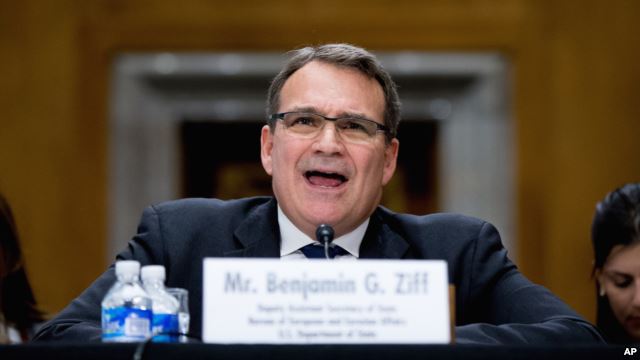
When a Russian news outlet edited the U.S. ambassador into a picture of an opposition rally, the U.S. Embassy countered by editing the ambassador into a series of improbable photos — for instance, on the moon and at an ice hockey rink.
The idea was to show that the original photo was propaganda, Deputy Assistant Secretary of State Benjamin Ziff told a Senate subcommittee in Washington on Tuesday.
The ploy worked. “This tweet was retweeted extensively within Russia,” he said.
But Ziff went on to tell senators that responding in a similar manner to every lie or phony situation “is counterproductive, because it is reactive and you are always behind the curve.”
Modern Russian propaganda is no longer concerned with censorship. Rather, it is widespread and prolific, filling up the media space to such an extent that people sometimes can’t tell what is right and what is not.
Ziff said the Russians have “a sophisticated $1.4 billion-a-year propaganda apparatus.” They claim to reach 600 million people across 130 countries.
“It’s skillful, it’s flexible and it’s adapted to the geography of the audience,” said Leon Aron, a resident scholar at the American Enterprise Institute, a public policy research group, and a member of the Broadcasting Board of Governors that oversees VOA.
‘Complete fake’
The impact of all that Russian disinformation on Western democracies “appears paltry,” Aron testified, adding that the main reason is a highly competitive media environment that exposes people to a wide range of facts and interpretations.
But he said the situation is “grimmer” going east to countries that were formerly part of the Soviet Union. Here, the effectiveness of Russian propaganda is greatly enhanced for two reasons: “First, the presence of ethnic Russian minorities, some of whom nurture grievances. And second, the existence of far fewer alternative sources of credible information.”
Here, Aron said, “the weaponization of information occurs” when it provokes strong negative emotions leading to hatred and worse.
Both Aron and Ziff told the Foreign Relations Committee’s subcommittee on Europe and regional security cooperation that the answer is to empower local communities to develop a rich and uncensored media environment.
Aron gave an example, citing a report aired on Russia’s most widely watched television channel. A terrified woman identified as a refugee from the territory controlled by the Ukrainian government said she witnessed Ukrainian soldiers publicly executing the wife and son of a pro-Russian separatist: “The child was crucified on a bulletin board in the center of the city, while the woman was allegedly dragged behind a tank until she was dead.”
“Complete fake,” said Aron, and it was exposed by the website stopfake.org, run by alumni and students of the Mohyla School of Journalism in Kyiv. Students tracked down the woman’s family. She had done the interview for money after her husband joined the pro-Russian separatists, leaving her with no means of support.
No value to truth
“If there is one key theme that runs through the Kremlin’s thinking, it’s cynicism,” testified book author Peter Pomerantsev of the Legatum Institute, a public policy think tank. It is a cynicism, he added, that makes no distinction between democracies and authoritarian regimes, between truth and lies.
“So it doesn’t matter if Vladimir Putin says one day there are no Russian soldiers in the Crimea and a few weeks later says, yes, there are, because what they are saying is there is no value to the idea of truth,” he said.
Pomerantsev said he worked with focus groups in Eastern Europe among the 90 million Russian speakers outside Russia. “They were like, … ‘We don’t believe anybody anymore but the Russians tell such an emotional story. It is so cinematic and entertaining that we go with the Russians.’ ”
Pomerantsev said it is too soon to know whether this trend is just a momentary thing or if it is something more long term and frightening. But if the dream of the social media age was to bring people together across borders, Russia “is the avant garde of making the information age into the disinformation age.”
Yet Pomerantsev has not given up on the idea of social media that unite. “The Instagrams and the Facebooks of these very tragic victims of this terrible plane crash — the Russian plane that exploded over Egypt — you look at their lives, you realize, ‘My God, they are no different than kids in Wichita [Kansas].”
By Molly McKitterick, Voice of America





